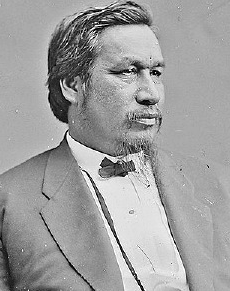Get Today in Masonic History into your Inbox. Sign up today for one of our email lists!
Need an article for your Trestleboard/Newsletter see our Use Policy
Ely Samuel Parker Passes Away

Today in Masonic History Ely Samuel Parker passes away in 1895.
Ely Samuel Parker was a Seneca tribal leader, lawyer and engineer.
Parker was born during 1828 in Indian Falls, New York. He was born Ha-sa-no-an-da, later he was baptized, his father was a Baptist minister, and named Ely Samuel Parker. He had a classical education at a missionary school. He was also fully bilingual speaking both Seneca (Iroquois) and English. Parker worked in a law firm reading law. At the time Native Americans were not considered United States Citizens, they received it in 1924 under the Indian Citizenship Act, so Parker was not allowed to take the bar exam. In the book Bury My Heart at Wounded Knee it is claimed Parker was not allowed to take the bar exam because he was not a white man. A subtle difference at best.
In the 1840's Parker met Lewis Henry Morgan, who was the head of an organization called The Grand Order of the Iroquois. The group was made up of young white men who were interested in learning more about Native American culture. Parker and Morgan became fast friends. Morgan and other interested young men often met at the Parker household to learn about the Seneca and Iroquois. Morgan later wrote a book on the subject. He dedicated the book to Parker and called it a collaboration of the two men.
Morgan helped Parker get into Rensselaer Polytechnic Institute to study engineering. Once he graduated he, Parker was able to find work doing upgrades and maintenance on the Erie Canal. He also worked in Galena, Illinois. In Galena Parker met and befriended Ulysses S. Grant.
When the Civil War broke out, Parker tried to raise a unit of Iroquois volunteers. They were turned down by the Governor of New York. Parker then decided to join the Army and was gain refused because he was not considered a United States citizen. Parker reached out to his friend Grant. Grant brought him into service as an engineer and eventually made Parker his adjutant. Parker became responsible for much of Grant's correspondence. By the end of the war, Parker resigned as a Brevet Brigadier General.
When Grant was elected President, he made Parker Commissioner of Indian Affairs from 1869 to 1871. After Parker left the position, he invested in the stock market. He unfortunately lost all of his fortune in the Panic of 1873. He was then appointed to the Board of Commissioners of the New York Police Department's Committee on Supplies and Repairs.
Parker passed away on August 31, 1895.
Parker was a member of Batavia Lodge No. 88 in 1847. He was a member of various lodges in New York and in Illinois. He was also a member of York Rite (Chapter, Council, Commandery) in New York as well as in Illinois.
This article provided by Brother Eric C. Steele.

